高级英语精读(二)
现代大学英语精读第二版book2unit8
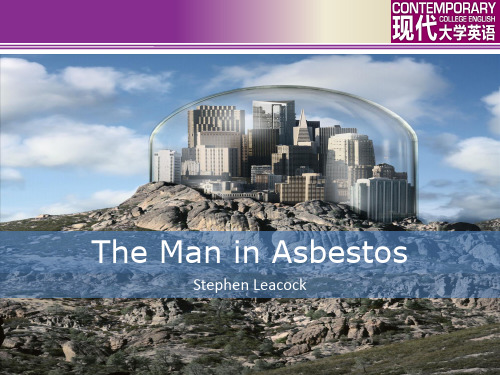
1
7-28 Astonished
2
29-55 Thrilled
3
56-66 Doubtful
4
67-78 Angry
Text Analysis
Detailed Analysis
Part I(1-6): Main Idea
Why did the narrator want to visit the future? How did the narrator fall into sleep? In what way might visiting the future in sleep be “straight suicide”? What is the narrator’s profession? How do you know? What do people often dream of? Do you have the sense of time in our dreams?
Warming up
Objectives
1. Expand your vocabulary 2. Expand your knowledge of English grammar 3. Understand the structure and the general idea of the story 4. Understand science fiction as a literary genre 5. Learn to appreciate and criticize a text in the framework of the time when it was written 6. Solve your own questions about the story
大学英语精读第二册(第三版)Unit4答案
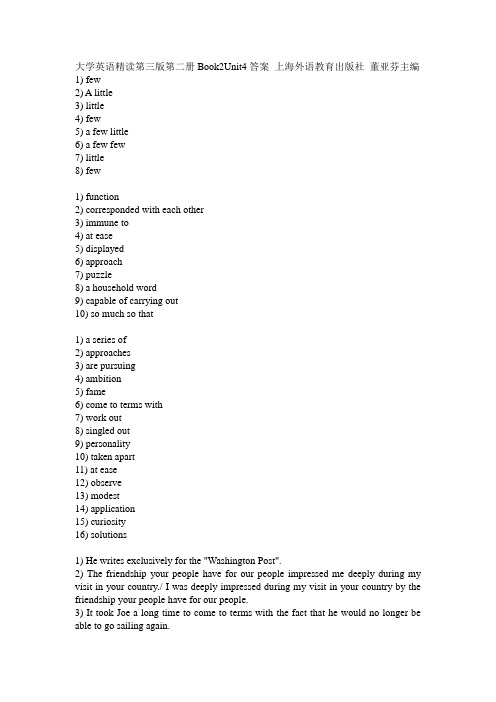
大学英语精读第三版第二册Book2Unit4答案上海外语教育出版社董亚芬主编1) few2) A little3) little4) few5) a few little6) a few few7) little8) few1) function2) corresponded with each other3) immune to4) at ease5) displayed6) approach7) puzzle8) a household word9) capable of carrying out10) so much so that1) a series of2) approaches3) are pursuing4) ambition5) fame6) come to terms with7) work out8) singled out9) personality10) taken apart11) at ease12) observe13) modest14) application15) curiosity16) solutions1) He writes exclusively for the "Washington Post".2) The friendship your people have for our people impressed me deeply during my visit in your country./ I was deeply impressed during my visit in your country by the friendship your people have for our people.3) It took Joe a long time to come to terms with the fact that he would no longer be able to go sailing again.4) Jim's grandfather believes more in fresh air and exercise than in medicine.5) Owing to his poor education he was frustrated in his attempt to find a good job.6) Most American cities are relatively small in terms of population when compared to Chinese cities like Shanghai and Beijing.1) emotional2) angry3) atomic4) exclusive5) famous6) jealous7) safe8) simple9) important10) valuable11) central12) delightful/delighted13) feasible14) fortunate15) personal16) capable17) sandy18) original19) curious20) easy1) typewriter2) honeymoon3) airport4) schoolmaster5) necklace6) eyesight7) loudspeaker8) sunrise9) heartbeat10) blood-test11) motorcycle12) crossroad13) spaceship14) superpower15) lifeboat16) rainstorm1) handbook/handmade/handsaw/handshake/handwork/handwriting2) housebreaker/housekeep/housekeeper/house arrest/housemate/housework3) workbook/workday/workmate/workshop/worksite/worktable4) bookkeeper/bookmark/book review/bookseller/bookshelf/bookstall5) riverside/roadside/bedside/dockside/inside/outside6) classroom/living room/reading room/waiting room/consulting room/dark room1) a drop of blood2) a grain of wheat3) a length of rope4) a lump of sugar5) a ball of string6) a block of marble7) a roll of toilet paper8) a helping of pie9) a blanket of heavy mist10) a slice of beef1) Joe's father was seen to return after dark.2) The wind was heard to roar through the trees.3) I don't think Tom can be made to take the boss's orders.4) The young man was seen to enter the building next to the bank.5) When she was in Shanghai the actress was heard to say she had long thought of this city as her second home.6) After the minister of education had finished speaking at the press conference, he was made to answer all sorts of questions.1) The doctor advised (that) Mike (should) stay in hospital until he was fully recovered.2) Cathy's father insisted (that) she (should) take a two-week rest before going back to work.3) The chairman of the Trade Union suggested (that) a special committee (should) be set up to look into the problem./ The chairman of the Trade Union suggested (that) they set up a special committee to look into the problem.4) The commander ordered (that) our company (should) start the attack before dawn.5) Knowing Jack to be dishonest, I demanded (that) he (should) tell me nothing but the truth.6) The dean of the philosophy department requested (that) the visiting scholar (should) give a lecture on Sartre.1) bewildered2) impressed3) modest4) profound5) displayed6) ambition7) singled out8) puzzle9) capable10) at ease1) by2) with3) listened4) gave5) told6) lecture7) sure8) Why9) for10) agreed11) two12) hall13) before14) place15) began16) single17) success18) people19) shaking20) followed21) before22) stopped23) a24) listened25) not26) nodded27) did28) thought29) but30) order31) was32) answer1) childhood2) a slow start3) mathematics4) grew up5) devote himself to research6) world-famous7) explain8) you think it's two hours9) the physical world10) conquer翻译1) 那小女孩跑得太快,身体一下失去平衡,跌倒了。
国际经贸高级英语精读1--3课课文翻译
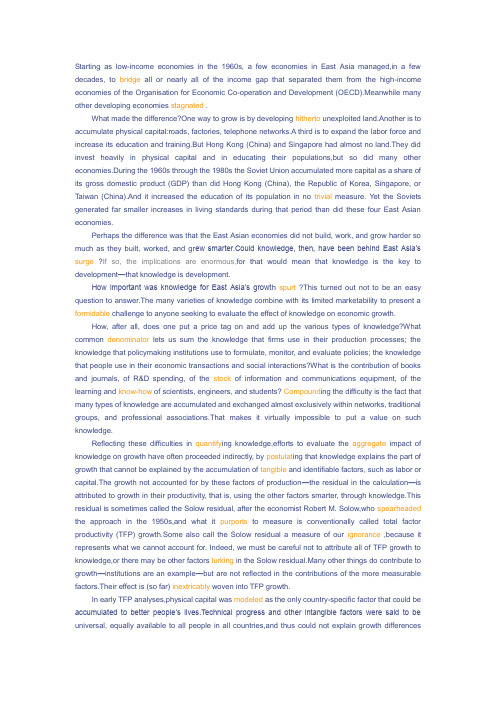
Starting as low-income economies in the 1960s, a few economies in East Asia managed,in a few decades, to bridge all or nearly all of the income gap that separated them from the high-income economies of the Organisation for Economic Co-operation and Development (OECD).Meanwhile many other developing economies stagnated .What made the difference?One way to grow is by developing hitherto unexploited land.Another is to accumulate physical capital:roads, factories, telephone networks.A third is to expand the labor force and increase its education and training.But Hong Kong (China) and Singapore had almost no land.They did invest heavily in physical capital and in educating their populations,but so did many other economies.During the 1960s through the 1980s the Soviet Union accumulated more capital as a share of its gross domestic product (GDP) than did Hong Kong (China), the Republic of Korea, Singapore, or Taiwan (China).And it increased the education of its population in no trivial measure. Yet the Soviets generated far smaller increases in living standards during that period than did these four East Asian economies.Perhaps the difference was that the East Asian economies did not build, work, and grow harder so much as they built, worked, and gr ew smarter.Could knowledge, then, have been behind East Asia’s surge ?If so, the implications are enormous,for that would mean that knowledge is the key to development—that knowledge is development.How important was knowledge for East Asia’s growt h spurt ?This turned out not to be an easy question to answer.The many varieties of knowledge combine with its limited marketability to present a formidable challenge to anyone seeking to evaluate the effect of knowledge on economic growth.How, after all, does one put a price tag on and add up the various types of knowledge?What common denominator lets us sum the knowledge that firms use in their production processes; the knowledge that policymaking institutions use to formulate, monitor, and evaluate policies; the knowledge that people use in their economic transactions and social interactions?What is the contribution of books and journals, of R&D spending, of the stock of information and communications equipment, of the learning and know-how of scientists, engineers, and students? Compound ing the difficulty is the fact that many types of knowledge are accumulated and exchanged almost exclusively within networks, traditional groups, and professional associations.That makes it virtually impossible to put a value on such knowledge.Reflecting these difficulties in quantify ing knowledge,efforts to evaluate the aggregate impact of knowledge on growth have often proceeded indirectly, by postulat ing that knowledge explains the part of growth that cannot be explained by the accumulation of tangible and identifiable factors, such as labor or capital.The growth not accounted for by these factors of production—the residual in the calculation—is attributed to growth in their productivity, that is, using the other factors smarter, through knowledge.This residual is sometimes called the Solow residual, after the economist Robert M. Solow,who spearheaded the approach in the 1950s,and what it purports to measure is conventionally called total factor productivity (TFP) growth.Some also call the Solow residual a measure of our ignorance ,because it represents what we cannot account for. Indeed, we must be careful not to attribute all of TFP growth to knowledge,or there may be other factors lurking in the Solow residual.Many other things do contribute to growth—institutions are an example—but are not reflected in the contributions of the more measurable factors.Their effect is (so far) inextricably woven into TFP growth.In early TFP analyses,physical capital was modeled as the only country-specific factor that could be accumulated to better people’s lives.Technical progress and other intangible factors were said to be universal, equally available to all people in all countries,and thus could not explain growth differencesbetween countries.Their contributions to growth were lumped with the TFP growth numbers.Although this assumption was convenient, it quickly became obvious that physical capital was not the only factor whose accumulation drove economic growth. A study that analyzed variations in growth rates across a large number of countries showed that the accumulation of physical capital explained less than 30 percent of those variations.The rest—70 percent or more—was attributed directly or indirectly to the intangible factors that make up TFP growth (Table 1.1).Later attempts introduced human capital to better explain the causes of economic growth.A higher level of education in the population means that more people can learn to use better technology. Education was surely a key ingredient in the success of four of the fastest-growing East Asian economies: Hong Kong (China), the Republic of Korea, Singapore, and Taiwan (China). Before their transformation from developing into industrializing economies, their school enrollment rates had been much higher than those of other developing countries (Table 1.2).They had also emphasized advanced scientific and technical studies—as measured by their higher ratios of students in technical fields than in even some industrial countries—thus enhancing their capacity to import sophisticated technologies.Moreover, the importance of education for economic growth had long been recognized and established empirically .One study had found that growth in years of schooling explained about 25 percent of the increase in GDP per capita in the United States between 1929 and 1982.Adding education reduced the part of growth that could not be explained,thus shrinking the haystack in which TFP growth (and knowledge) remained hidden.Some analysts even concluded, perhaps too quickly,that physical and human capital, properly accounted for, explained all or virtually all of the East Asian economies’ rapid growth,leaving knowledge as a separate factor out of the picture.One re ason these analysts came up with low values for TFP growth is that they incorporated improvements in labor and equipment into their measurement of factor accumulation.So even their evidence of low TFP growth in East Asia does not refute the importance of closing knowledge gaps.Indeed, it shows that the fast-growing East Asian economies had a successful strategy to close knowledge gaps:by investing in the knowledge embodi ed in physical capital, and by investing in people and institutions to enhance the capability to absorb and use knowledge.Looking beyond East Asia,other growth accounting studies have examined larger samples of countries.Even when human capital is accounted for,the unexplained part of growth remains high.One such study, of 98 countries with an unweighted average growth rate of output per worker of 2.24 percent,found that 34 percent (0.76 percentage point) of that growth came from physical capital accumulation,20 percent (0.45 percentage point) from human capital accumulation,and as much as 46 percent (just over 1 percentage point) from TFP growth.Even more remains to be explained in variations in growth rates across countries. The same study found the combined role of human and physical capital to be as low as 9 percent, leaving the TFP residual at a staggering 91 percent.To take another example:Korea and Ghana had similarly low incomes per capita in the 1950s,but by 1991 Korea’s income per capita was more than seven times Ghana’s.Much of that gap remains unexplained even when human capital is taken into account .All these results are subject to measurement problems.For example, the measured stock of human capital may overstate the actual quantity used in producing goods and services.High rates of school enrollment or attainment (years completed) may not translate into higher rates of economic growthif the quality of education is poor, or if educated people are not employed at their potential because of distortion s in the labor market.Moreover, it is now evident that education without openness to innovation and knowledge will notlead to economic development.The people of the former Soviet Union, like the people of the OECD countries and East Asia, were highly educated, with nearly 100 percent literacy .And for an educated population it is possible,through foreign direct investment and other means,to acquire and use information about the latest production and management innovations in other countries.But the Soviet Union placed severe restrictions on foreign investment, foreign collaboration, and innovation.Its work force did not adapt and change as new information became available elsewhere in the world, and consequently its economy suffered a decline.(excerpted from World Development Report 1998/1999)一些东亚国家在20世纪60年代还是低收入国家,但是在短短的几十年之间,他们成功地弥补了其与经济合作与发展组织(OECD)中高收入国家之间的差距;与此同时,也有许多发展中国家的经济停滞不前。
大学英语精读2的课文翻译
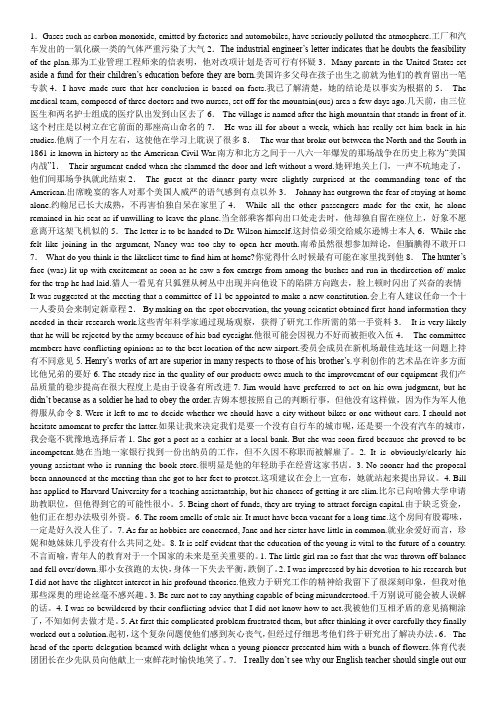
1.Gases such as carbon monoxide, emitted by factories and automobiles, have seriously polluted the atmosphere.工厂和汽车发出的一氧化碳一类的气体严重污染了大气2.The industrial engineer’s letter indicates that he doubts the feasibility of the plan.那为工业管理工程师来的信表明,他对改项计划是否可行有怀疑3.Many parents in the United States set aside a fund for their children’s education before they are born.美国许多父母在孩子出生之前就为他们的教育留出一笔专款4.I have made sure that her conclusion is based on facts.我已了解清楚,她的结论是以事实为根据的5.The medical team, composed of three doctors and two nurses, set off for the mountain(ous) area a few days ago.几天前,由三位医生和两名护士组成的医疗队出发到山区去了6.The village is named after the high mountain that stands in front of it.这个村庄是以树立在它前面的那座高山命名的7.He was ill for about a week, which has really set him back in his studies.他病了一个月左右,这使他在学习上耽误了很多8.The war that broke out between the North and the South in 1861 is known in history as the American Civil War.南方和北方之间于一八六一年爆发的那场战争在历史上称为“美国内战”1.Their argument ended when she slammed the door and left without a word.她砰地关上门,一声不吭地走了,他们间那场争执就此结束2.The guest at the dinner party were slightly surprised at the commanding tone of the American.出席晚宴的客人对那个美国人威严的语气感到有点以外3.Johnny has outgrown the fear of staying at home alone.约翰尼已长大成熟,不再害怕独自呆在家里了4.While all the other passengers made for the exit, he alone remained in his seat as if unwilling to leave the plane.当全部乘客都向出口处走去时,他却独自留在座位上,好象不愿意离开这架飞机似的5.The letter is to be handed to Dr. Wilson himself.这封信必须交给威尔逊博士本人6.While she felt like joining in the argument, Nancy was too shy to open her mouth.南希虽然很想参加辩论,但腼腆得不敢开口7.What do you think is the likeliest time to find him at home?你觉得什么时候最有可能在家里找到他8.The hunter’s face (was) lit up with excitement as soon as he saw a fox emerge from among the bushes and run in thedirection of/ make for the trap he had laid.猎人一看见有只狐狸从树丛中出现并向他设下的陷阱方向跑去,脸上顿时闪出了兴奋的表情It was suggested at the meeting that a committee of 11 be appointed to make a new constitution.会上有人建议任命一个十一人委员会来制定新章程2.By making on-the-spot observation, the young scientist obtained first-hand information they needed in their research work.这些青年科学家通过现场观察,获得了研究工作所需的第一手资料3.It is very likely that he will be rejected by the army because of his bad eyesight.他很可能会因视力不好而被拒收入伍4.The committee members have conflicting opinions as to the best location of the new airport.委员会成员在新机场最佳选址这一问题上持有不同意见5. Henry’s works of art are superior in many respects to those of his brother’s.亨利创作的艺术品在许多方面比他兄弟的要好6. The steady rise in the quality of our products owes much to the improvement of our equipment我们产品质量的稳步提高在很大程度上是由于设备有所改进7. Jim would have preferred to act on his own judgment, but he didn’t because as a soldier he had to obey the order.吉姆本想按照自己的判断行事,但他没有这样做,因为作为军人他得服从命令8. Were it left to me to decide whether we should have a city without bikes or one without cars. I should not hesitate amoment to prefer the latter.如果让我来决定我们是要一个没有自行车的城市呢,还是要一个没有汽车的城市,我会毫不犹豫地选择后者1. She got a post as a cashier at a local bank. But she was soon fired because she proved to be incompetent.她在当地一家银行找到一份出纳员的工作,但不久因不称职而被解雇了。
大学英语精读第三版第二册课后答案
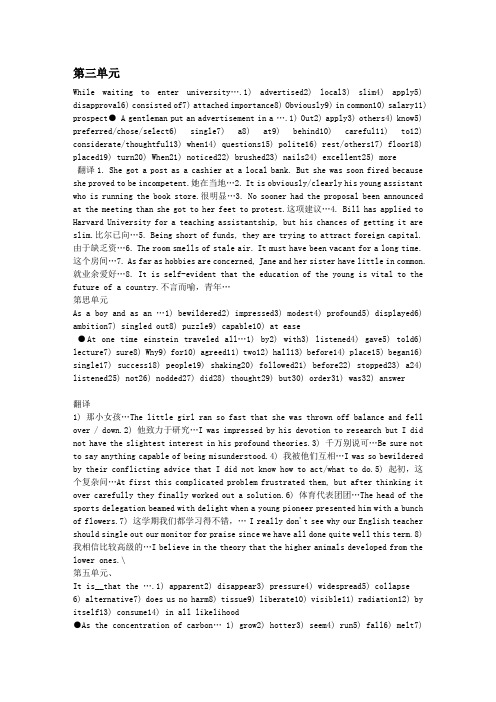
第三单元While waiting to enter university….1) advertised2) local3) slim4) apply5) disapproval6) consisted of7) attached importance8) Obviously9) in common10) salary11) prospect● A gentleman put an advertisement in a ….1) Out2) apply3) others4) know5) preferred/chose/select6) single7) a8) at9) behind10) careful11) to12) considerate/thoughtful13) when14) questions15) polite16) rest/others17) floor18) placed19) turn20) When21) noticed22) brushed23) nails24) excellent25) more翻译1. She got a post as a cashier at a local bank. But she was soon fired because she proved to be incompetent.她在当地…2. It is obviously/clearly his young assistant who is running the book store.很明显…3. No sooner had the proposal been announced at the meeting than she got to her feet to protest.这项建议…4. Bill has applied to Harvard University for a teaching assistantship, but his chances of getting it are slim.比尔已向…5. Being short of funds, they are trying to attract foreign capital. 由于缺乏资…6. The room smells of stale air. It must have been vacant for a long time. 这个房间…7. As far as hobbies are concerned, Jane and her sister have little in common.就业余爱好…8. It is self-evident that the education of the young is vital to the future of a country.不言而喻,青年…第思单元As a boy and as an …1) bewildered2) impressed3) modest4) profound5) displayed6) ambition7) singled out8) puzzle9) capable10) at ease●At one time einstein traveled all…1) by2) with3) listened4) gave5) told6) lecture7) sure8) Why9) for10) agreed11) two12) hall13) before14) place15) began16) single17) success18) people19) shaking20) followed21) before22) stopped23) a24) listened25) not26) nodded27) did28) thought29) but30) order31) was32) answer翻译1) 那小女孩…The little girl ran so fast that she was thrown off balance and fell over / down.2) 他致力于研究…I was impressed by his devotion to research but I did not have the slightest interest in his profound theories.3) 千万别说可…Be sure not to say anything capable of being misunderstood.4) 我被他们互相…I was so bewildered by their conflicting advice that I did not know how to act/what to do.5) 起初,这个复杂问…At first this complicated problem frustrated them, but after thinking it over carefully they finally worked out a solution.6) 体育代表团团…The head of the sports delegation beamed with delight when a young pioneer presented him with a bunch of flowers.7) 这学期我们都学习得不错,…I really don't see why our English teacher should single out our monitor for praise since we have all done quite well this term.8) 我相信比较高级的…I believe in the theory that the higher animals developed from the lower ones.\第五单元、It is__that the ….1) apparent2) disappear3) pressure4) widespread5) collapse6) alternative7) does us no harm8) tissue9) liberate10) visible11) radiation12) by itself13) consume14) in all likelihood●As the concentration of carbon… 1) grow2) hotter3) seem4) run5) fall6) melt7)means8) away9) retreat10) to11) necessarily12) possible13) so14) exist15) gained16) though17) found18) another19) piled20) stay21) causing22) flooded23) farther翻译1) 如果富…If the rich countries spent more money on green industries, instead of on building up military machines and nuclear weapons, many of today's widespread pollution problems would gradually disappear.2) 烧煤的时…The burning of coal not only consumes the oxygen in the house but also gives out poisonous gases.3) 显然,找到…Apparently, finding alternative energy sources is essential to the steady development of our economy.4) 太阳能电池…Solar cells can absorb sunlight and convert it into electricity.5) 如果地球上的…If the temperature on the Earth continues to go up from year to year, the polar ice caps will begin to melt and, in all likelihood, half of the buildings in coastal cities will disappear beneath splashing sea waves.6) 因为这些生物…Because these creatures are small and tend to hide beneath leafy plants, they are not always visible to the naked eye.7) 由于受到原…As a result of exposure to atomic radiation, he finally collapsed at work.8) 有明显的…There is distinct evidence of the connection between heavy pressure of work and some disorders of the body.第六单元Dr.nolen believes that…1) surgical2) confident3) dwell on4) emergency5) sweat6) competent7) at one time or another8) relax●A man went to see his … 1) from2) examined3) nothing4) trouble5) much6) same7) ago8) advice9) you10) pay11) worry12) followed13) again14) quite15) that16) tailor The patient was lying in ….B1) how2) answer3) cut4) surgeon5) had6) over7) only8) found9) by10) got11) then12) saying13) around翻译1) 只要你不断…If / As long as you keep (on) trying, you will be able to resolve this difficult problem sooner or later.2) 我们预料我…We anticipate encountering / that we will encounter resistance to our plan / our plan will meet with resistance.3) 吉姆的朋友说,他们那…Jim's friends said that the noise pollution in their city was terrible, but they had to live with it.4) 汤姆起初认为,凭他的知识、…At first Tom thought that with his knowledge, skill and experience he was bound to find a satisfactory job.5) 冷静耐心地处理…It would be wise / advisable to handle this delicate problem with calmness and patience.6) 迪克以为,如果他拆不开…Dick thought that if he wasn't able to take the machine apart, chances were that no other worker in the plant could, either.7) 你是否认为公共…Do you think bus drivers should take full responsibility for the passengers' safety?8) 你不必再去多想那…You needn't dwell on your mistakes in judgment any more. What's important is to try your best to avoid repeating them.第七单元My friends and I …1) moved in2) waged3) property4) take a stand5) drifted6) tragedy7) prompt8) impact9) took to10) got through to11) ran into12) fussingA mos’s heart sank when his… 1) Judging2) Confronted3) change4) You5) treated6) But7) set8) never9) called/named10) boy's11) your12) the13) on14) make15) bring16) through17) later18) showing翻译1) 在当地政…Under the leadership of the local government, the villagers rose to the serious food crisis caused by the floods.2) 这个展览会…The exhibition is very popular and is attracting a steady stream of visitors.3) 妈妈上楼来…When Mom came upstairs to check on us kids, I turned overand pretended to be asleep.4) 对阿姆斯特德来说…Waging a battle against the drug pushers was a challenge to Armstead. She felt rather nervous but she decided to confront them.5) 老太太叫我小…The old lady told me to be cautious and not to talk to the guys hanging out on the street corner.6) 一个卫生组织…A health organization prompted the local government to raise a three-million-dollar fund for a new hospital.7) 那个曾放火烧教…Opening the door, the man who had set fire to the church found himself confronted by a dozen policemen with guns.8) 据报道,燃…It is reported that the fire which raged for more than two hours started in an abandoned warehouse / store.第八单元Tom brown was a good boxer…1) pair2) never3) very4) won5) On6) happened7) when8) along9) stopped10) help11) to12) station13) found14) gone15) lying16) this17) recognized18) back19) like20) strong21) fists22) got23) never24) on翻译1) 巨额投资…Vast amounts of investment have enabled the economy of the area to grow rapidly.2) 他们为新建…They launched a campaign to raise money for a new hospital.3) 成功在于…Success lies in diligence. Dr. Nolen is a case in point.4) 他们都具有…Men of high moral standards, they are never to be tempted into taking such expensive gifts.5) 有迹象表明,…There are indications that numerous factories are faced with a very difficult situation.6) 警方找到谁是罪..The police arrested the criminal on a charge of armed robbery several hours after they found an important clue to his identity.7) 调查显示,对某些…Investigation has revealed that retirement tends to cause psychological troubles for some people.8) 医疗队并没有一味抱…The medical team did more than complain about the relatively poor working conditions at the local hospital. For instance, several doctors bought simple medical instruments with their own money.。
大学英语精读第三版第二册英语课后翻译答案

6. The village is named after the front of it.
这个村庄是以树立在它前面的那座高山命名的
7. He was ill for about a week, which has really set him back in his studies.
英语翻译第二章
1. Their argument ended when she slammed the door and left without a word.
她砰地关上门,一声不吭地走了,他们间那场争执就此结束
2. The guest at the dinner party were slightly surprised at the commanding tone of the American.
她在当地一家银行找到一份出纳员的工作,但不久因不称职而被解雇了。
2. It is obviously/clearly his young assistant who is running the book store.
很明显是他的年轻助手在经营这家书店。
3. No sooner had the proposal been announced at the meeting than she got to her feet to protest.
这个房间有股霉味,一定是好久没人住了。
7. As far as hobbies are concerned, Jane and her sister have little in common.
就业余爱好而言,珍妮和她妹妹几乎没有什么共同之处。
【英语学习】大学英语精读第三版第二册英语课后翻译答案共(4页)
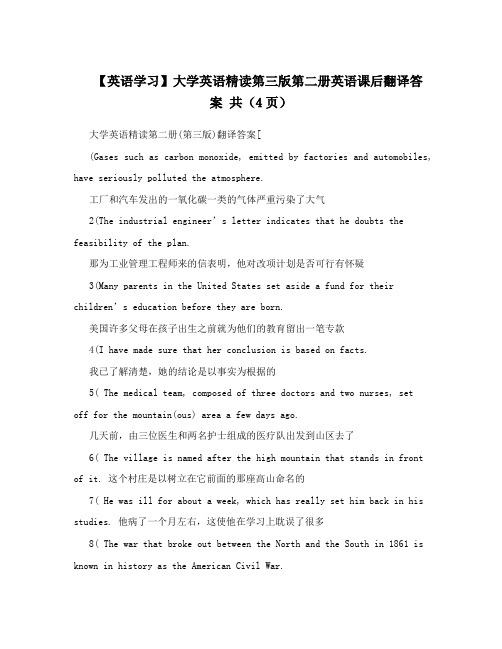
【英语学习】大学英语精读第三版第二册英语课后翻译答案共(4页)大学英语精读第二册(第三版)翻译答案[(Gases such as carbon monoxide, emitted by factories and automobiles, have seriously polluted the atmosphere.工厂和汽车发出的一氧化碳一类的气体严重污染了大气2(The industrial engineer’s letter indicates that he doubts the feasibility of the plan.那为工业管理工程师来的信表明,他对改项计划是否可行有怀疑3(Many parents in the United States set aside a fund for their children’s education before they are born.美国许多父母在孩子出生之前就为他们的教育留出一笔专款4(I have made sure that her conclusion is based on facts.我已了解清楚,她的结论是以事实为根据的5( The medical team, composed of three doctors and two nurses, setoff for the mountain(ous) area a few days ago.几天前,由三位医生和两名护士组成的医疗队出发到山区去了6( The village is named after the high mountain that stands in front of it. 这个村庄是以树立在它前面的那座高山命名的7( He was ill for about a week, which has really set him back in his studies. 他病了一个月左右,这使他在学习上耽误了很多8( The war that broke out between the North and the South in 1861 is known in history as the American Civil War.南方和北方之间于一八六一年爆发的那场战争在历史上称为“美国内战”英语翻译第二章1( Their argument ended when she slammed the door and left without a word. 她砰地关上门,一声不吭地走了,他们间那场争执就此结束2( The guest at the dinner party were slightly surprised at the commanding tone of the American.出席晚宴的客人对那个美国人威严的语气感到有点以外3( Johnny has outgrown the fear of staying at home alone.约翰尼已长大成熟,不再害怕独自呆在家里了4( While all the other passengers made for the exit, he alone remained in his seat as if unwilling to leave the plane.当全部乘客都向出口处走去时,他却独自留在座位上,好象不愿意离开这架飞机似的5( The letter is to be handed to Dr. Wilson himself.这封信必须交给威尔逊博士本人6( While she felt like joining in the argument, Nancy was too shy to open her mouth. 南希虽然很想参加辩论,但腼腆得不敢开口7( What do you think is the likeliest time to find him at home? 你觉得什么时候最有可能在家里找到他8( The hunter’s face (was) lit up with e xcitement as soon as he saw a fox emerge fromamong the bushes and run in thedirection of/ make for the trap he had laid.猎人一看见有只狐狸从树丛中出现并向他设下的陷阱方向跑去,脸上顿时闪出了兴奋的表情英语翻译第三章1( It was suggested at the meeting that a committee of 11 be appointed to make a new constitution.会上有人建议任命一个十一人委员会来制定新章程2( By making on-the-spot observation, the young scientist obtained first-hand information they needed in their research work.这些青年科学家通过现场观察,获得了研究工作所需的第一手资料3( It is very likely that he will be rejected by the army because of his bad eyesight. 他很可能会因视力不好而被拒收入伍4( The committee members have conflicting opinions as to the best location of the new airport.委员会成员在新机场最佳选址这一问题上持有不同意见5. Henry’s works of art are superior in many respects to those of his brother’s.亨利创作的艺术品在许多方面比他兄弟的要好6. The steady rise in the quality of our products owes much to the improvement of our equipment.我们产品质量的稳步提高在很大程度上是由于设备有所改进7. Jim would have preferred to act on his own judgment, but he didn’t because as a soldier he had to obey th e order.吉姆本想按照自己的判断行事,但他没有这样做,因为作为军人他得服从命令8. Were it left to me to decide whether we should have a citywithout bikes or one without cars. I should not hesitate a moment to prefer the latter.如果让我来决定我们是要一个没有自行车的城市呢,还是要一个没有汽车的城市,我会毫不犹豫地选择后者英语翻译第四章1. She got a post as a cashier at a local bank. But she was soonfired because she proved to be incompetent.她在当地一家银行找到一份出纳员的工作,但不久因不称职而被解雇了。
英语精读方法和技巧
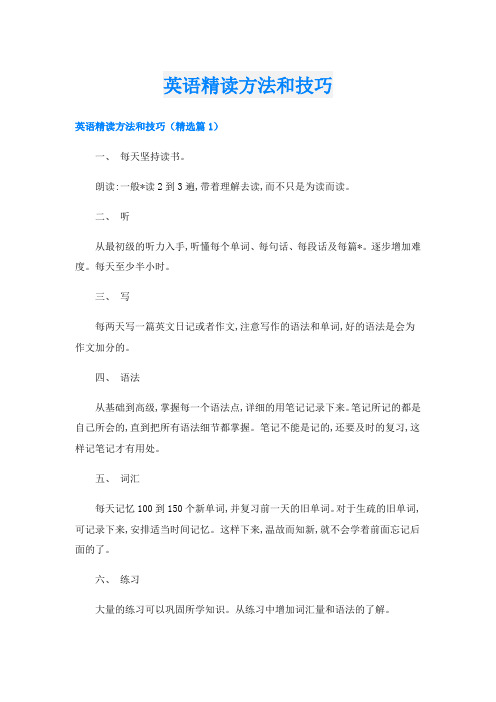
英语精读方法和技巧英语精读方法和技巧(精选篇1)一、每天坚持读书。
朗读:一般*读2到3遍,带着理解去读,而不只是为读而读。
二、听从最初级的听力入手,听懂每个单词、每句话、每段话及每篇*。
逐步增加难度。
每天至少半小时。
三、写每两天写一篇英文日记或者作文,注意写作的语法和单词,好的语法是会为作文加分的。
四、语法从基础到高级,掌握每一个语法点,详细的用笔记记录下来。
笔记所记的都是自己所会的,直到把所有语法细节都掌握。
笔记不能是记的,还要及时的复习,这样记笔记才有用处。
五、词汇每天记忆100到150个新单词,并复习前一天的旧单词。
对于生疏的旧单词,可记录下来,安排适当时间记忆。
这样下来,温故而知新,就不会学着前面忘记后面的了。
六、练习大量的练习可以巩固所学知识。
从练习中增加词汇量和语法的了解。
英语精读方法和技巧(精选篇2)一半是基本功,一半是技巧。
基本功漫谈阅读的基本功是取得阅读高分重要保证,但这需要从长计议,非短期能奏效。
中国大学英语教学体制是中国考生阅读理解能力低的主要原因。
几乎所有到美国读书的中国学生会感觉到自己的阅读能力明显不足,因为在国外,通常学生每次课后作业需要阅读长达数十页到数百页的*,非常不适应,感到自己多年来在中国炼就的高超语法水平(如虚拟语气有多少种特例、很多八百年都用不上一次的词语搭配)却无用武之处。
据我多年应试与教学的体会,中国学生阅读最大的障碍在于对英语长句、复杂句的感觉和把握。
*读不懂,其实读不懂的还是难的句子,目前在研究生入学考试阅读部分中出现含有50~70个词汇长度的句子已属司空见惯,如果文中充满了主系和主谓宾单句的话,恐怕没有谁读不懂!对于大多数同学而言,个别单词不认识并不会造成语义理解的障碍,除非您的单词量实在是太小了,事实上很多同学阅读水平处在这样的一个阶段:很多单词是认识的,但句子长的,结构复杂了,句子语义理解起来就很慢、很吃力,或根本不理解,从而导致整个*理解的障碍。
- 1、下载文档前请自行甄别文档内容的完整性,平台不提供额外的编辑、内容补充、找答案等附加服务。
- 2、"仅部分预览"的文档,不可在线预览部分如存在完整性等问题,可反馈申请退款(可完整预览的文档不适用该条件!)。
- 3、如文档侵犯您的权益,请联系客服反馈,我们会尽快为您处理(人工客服工作时间:9:00-18:30)。
高等教育自学考试旅游英语(050222)本科专业高级英语精读(二)(01258)自学考试大纲黑龙江大学外语教学研究部目录编写前言编写说明一、课程性质和学习目的1、本课程的性质2、本课程设置的目的3、总体课程教学要求4、本课程与其它专业课程的关系5、学时安排二、自学考试大纲有关说明和实施要求1、考纲与教材关系2、考核目标3、命题原则4、学习要求5、自学教材6、自学方法7、社会助学8、本课程训练内容及方法三、课程内容和考核目标Lesson One: What’s Wrong with Our Press?Lesson Two: What to Listen for in MusicLesson Three: EvelineLesson Four: The Tragedy of Old Age in America Lesson Five: The Spanish BullfightLesson Six: Jerusalem the Golden (Excerpt)Lesson Seven: Science Has Spoiled My Supper Lesson Eight: I’ll Never Escape the GhettoLesson Nine: VivisectionLesson Ten: On Human nature and PoliticsLesson Eleven: Is America Falling Apart?Lesson Twelve: The Everlasting WitnessLesson Thirteen: Ace in the HoleLesson Fourteen:Selected Snobberies Lesson Fifteen: Three-Dimensional Youth四、样题及参考答案编写前言为了适应社会主义现代化建设事业对培养人才的需要,我国20世纪80年代初建立了高等教育自学考试制度,经过近20年的发展,高等教育自学考试已成为我国高等教育基本制度之一。
高等教育自学考试是个人自学,社会助学和国家考试相结合的一种新的高等教育形式,是我国高等教育体系的一个组成部分。
实行高等教育自学考试制度,是落实宪法规定的“鼓励自学成材”的重要措施,是提高中华民族思想道德和科学文化素质的需要,也是造就和提拔人才的一种途径。
应考者通过规定的考试课程并经思想品德鉴定达到毕业要求的,可以获得毕业证书,国家承认学历并按照规定享有与普通高等学校毕业生同等的有关待遇。
从80年代初期开始,各省、自治区、直辖市先后成立了高等教育自学考试委员会,开展了高等教育自学考试工作,为国家培养造就了大批专门人才。
为科学、合理地制定高等教育自学考试标准,提高教育质量,全国高等教育自学考试指导委员会(以下简称全国考委)组织各方面专家对高等教育自学考试专业设置进行了调整,统一了专业设置标准,全国考委陆续制定了几十个专业考试计划。
再此基础上,各专业委员会按照专业考试计划的要求,从造就和选拔人才的需要出发,编写了相应专业的课程自学考试大纲,进一步规定了课程学习和考试的内容与范围,有利于社会助学,使自学要求明确,考试标准规范化、具体化。
黑龙江省考委根据国务院发布的《高等教育自学考试暂行条例》,参照教育部拟定的普通高等学校有关课程的教学大纲,结合自学考试的特点,组织制定了《高级英语精读(二)自学考试大纲》。
《高级英语精读(二)自学考试大纲》是该课程编写教材和自学辅导书的依据,也是个人自学,社会助学和国家考试(课程命题)的依据,希望各位应考者及授课教师应认真贯彻执行。
黑龙江大学应用外语学院二OO九年十月编写说明中国加入WTO 意味着中国将进一步与世界各国的政治、经济、文化各个方面的交流与合作力度的加大。
然而,中国经济的发展在许多领域里都面临着人才匮乏的局面,特别是能够适应国际竞争需要的国际管理人才,因此,培养并造就一批优秀的国际化人才,是我们在新一轮国际竞争中赢得主动的关键。
黑龙江大学应用外语学院正是根据人才市场的这一需求,凭借多年开办应用英语专业的经验以及雄厚的应用英语师资力量,特开办了旅游英语专业(独立本科段)。
一方面为国家解决国际性旅游行业人才缺乏尽一份微薄之力;另一方面,也为有志于在国际旅游市场方面有更深要求的人士,提供了一个深造的机会。
为此,我们经过课程的精心论证、挑选了有丰富教学和实践经验的教师,认真的选择了有针对性的教材来满足学员的要求。
根据《高级英语精读(二)》的课程要求,我们编写了本书的考试大纲。
本考试大纲依据高等自学考试旅游英语(独立本科段)专业的考试计划的要求编写而成,使学生在旅游英语的听,说,读,写等各方面都得到了贴近实际工作的训练,在学习规范的旅游用语的同时,也学到了专业的旅游方面的知识。
针对以上要求,本考试大纲进一步规定了课程学习和考试的内容与范围,有利于社会助学,使自学要求明确,考试标准规范化、具体化。
本考试大纲的目的在于使学生在学习的过程中,能够思路清晰、重点突出、一目了然。
知道哪些知识应该必须掌握;哪些知识应该理解;哪些知识应该作为一般性的了解;同时也有利于学习者学以致用,并能够帮助学员最大限度的发挥自己的潜能达到学习的目的,顺利的通过考试,用所学到的知识解决实际工作中的问题。
能够达到这样一个目的,是我们开办旅游英语专业(独立本科段)的办学目的,也是广大学员所衷心希望的。
一、课程的性质和学习目的1、本课程的性质高级英语精读(二)是高等自学考试旅游英语专业(独立本科段)的必考的基础课程。
高级英语精读(二)是根据旅游英语自学考试的需要而设置的。
本课程是完成基础阶段学业后进一步巩固提高的阶段,要求学生具有扎实的运用英语进行交际的基本功,即在听、说、读、写、译方面熟练地运用英语;具有较全面的英语语言和文化知识,能用英语自由表达自己的思维,会使用主要的工具书和计算机等科技手段,具有较强的科研和撰写学术论文的能力;在需要和可能的条件下结合英语掌握某一专业方向,培养学生的创新、社交和涉外工作能力,使学生具备较强的英语交际和独立的工作能力。
2、本课程设置的目的高级英语精读(二),是根据旅游英语自学考试的需要而设置。
通过该课程的学习使学生具有扎实的运用英语进行交际的基本功,即在听、说、读、写、译方面熟练地运用英语;具有较全面的英语语言和文化知识,能用英语自由表达自己的思维,并培养学生具有较强的科研和撰写学术论文的能力。
3、总体课程教学要求高级英语精读(二)是专业基础课,要求学生在通过由浅入深的系统学习与练习后能具备实际运用语言进行口头交际和英文写作的能力,也能顺利通过自学考试。
4、本课程与其它专业课的关系高级英语精读(二)是高等自学考试旅游英语专业(独立本科段)的必考基础课程,它虽然是以通过提高学生的听、说、读、写等综合能力并以通过国际统一考试为教学目的,但它与旨在培养学生综合运用语言能力的“旅游英语”的专业核心课程是相辅相成的,并有助于学生顺利的完成论文写作。
5、学时安排高级英语精读(二)为8学分的基础的课程,其授课进程为18周,每周8学时。
二、有关说明和实施要求1、考纲与教材的关系本考试大纲本着科学性、指导性、可行性和可检查性的原则,所作的各项规定是旅游英语专业基础阶段高级英语精读(二)编写教材、个人自学、国家考试命题,社会助学和检查学习质量的依据。
高级英语精读(二)教材的总体要求和总体水平以及教材的选材、习题设计等方面与大纲中规定的课程性质、任务、内容、考核目标等方面的内容相一致。
2、考核目标为了使本课程的自学考试达到标准化、规范化的要求,本大纲在规定各章自学考试内容提要的基础上,对各章规定了考核目标,包括考核知识点和考核要求,明确考核目标、可使应考者进一步了解考试内容和要求,知道怎么学和怎么考,更有目的有计划地学习教材;可使社会助学单位知道应该如何组织教学,根据应考者的实际情况进行辅导,使之达到既定的要求;可使命题单位正确把握试题的广度、深度和难易程度。
考核知识点是指考核知识范围的广度,明确考生最低限度应该掌握的知识内容。
考核要求是指需要应考者掌握知识的深度和应用知识的能力。
本大纲中的考核要求按照“了解”“掌握”“领会”、“应用”四个应达到的能力层次来规定。
四个能力层次是递进的等级关系,各个能力层次的含义如下:了解:是指要求应考者对本课程的基本知识和相关知识应有所知晓。
掌握:是指要求应考者对基本方法和基本技能,不仅要知道“是什么”,“为什么”,而且要学会“怎么做”、“在什么情况下如何处理”,要能够独立操作。
领会:能全面把握有关的基本概念、基本原则、基本方法、并能表述其基本内容和基本道理,分析相关问题的区别和联系。
应用:能运用基本概念、基本原则、基本方法等去分析有关的理论问题,处理某些实际问题,进行分析。
3、命题原则(1)本课程考试的命题,应根据本大纲所规定的考试内容提要和考试目标,确定考试范围和考核标准,不要扩大或缩小考试范围,也不要提高或降低考核标准。
考试内容要覆盖到各个章节,并适当突出课程的重点内容,难易程度要适中。
(2)试题要合理安排题目的考察能力层次结构。
每份考卷中各种能力层次题目所占的分数比例一般为:了解占10%,掌握占10%,领会占30%,应用占50%。
(3)试题要合理安排难度结构。
试题难易程度可分为易、较易、较难、难四个等级。
每份试卷中,不同难易程度试题的分数比例一般为:易占20%;较易占40%;较难30%;难占10%。
试验难度和能力层次不是一个概念,在各能力层次中都会有不同难度的问题,切勿将二者混淆。
在每一个能力层次的题目中,都会难易程度不同的问题。
(4)本课程考试要合理安排试卷的题型结构。
本课程题型分为听,说,读和写。
(5)评分要求采用百分制,60分为及格。
考试为一次性通过,每次考试时间150分。
4、自学教材指定教材《大学英语教程》第六册,张中载著,外语教学与研究出版社,2006年版。
5.自学方法根据本课程的目的要求,应考者在学习中应该着重掌握以下几个环节:(1)认真阅读教材。
阅读教材是基本的教学环节。
只有把教材仔细消化了,其他学习环节才能搞好。
如果不把教材真正弄懂弄通,就忙于阅读其他教学资料或做复习题,必然事倍功半。
阅读教材前,应先看自学大钢中的学习目的和要求及内容提要,理解每一章节的要点,然后系统地读书。
读书时,首先要掌握每一章的梗概,弄清每一章的重点内容;其次在全面理解每章内容的基础上,要把本章与以前各章内容联系起来加以思考。
(2)作好读书笔记。
写读书笔记是巩固所学知识的一个重要方法,这对于自学尤为重要。
阅读教材是理解课程内容的基础,但看了书并不一定就能弄懂弄通,更不一定就能学得扎实。
要切实掌握课程内容,必须将读书与思考结合起来,手脑并用,通过笔记用自己的英语表述出来,变成自己的东西。
